Words With Orchestroll: Montreal, Milan, Ghosts in the Machine
Jesse Osborne-Lanthier and Asaël Robitaille discuss collaboration, hybridization, soundsystem ambient, and "Corrosiv," their new album on 29 Speedway.
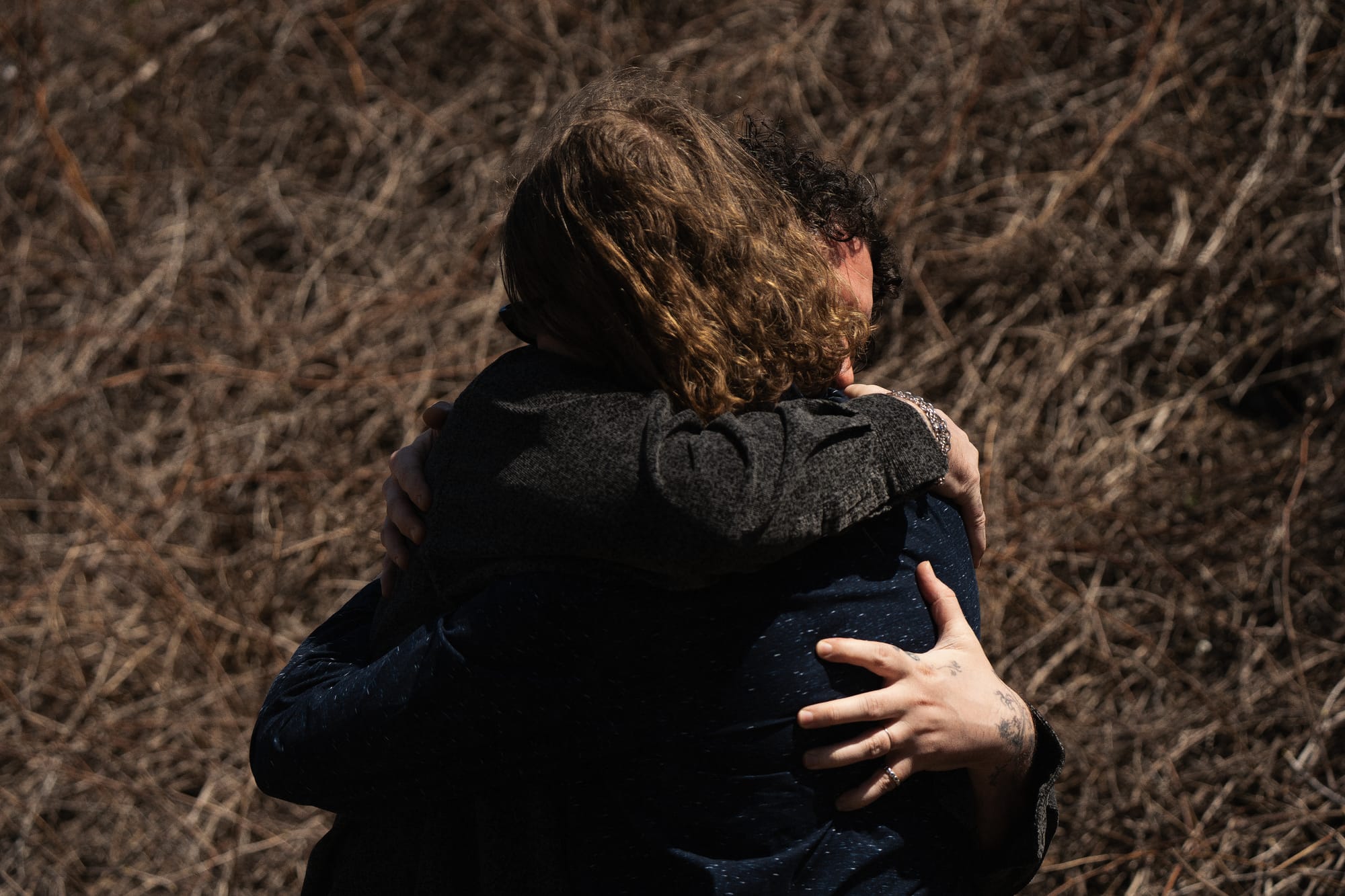
Fellow Montreal artist and sound designer Asaël Robitaille has produced cosmic new age-adjacent sounds for just as long, frequently collaborating with Marie Davidson all the while.
Osborne-Lanthier and Robitaille have worked together since they first met. In 2020, they launched a record label, Éditions Appærent, a collective effort with Vancouver artist Will Ballantyne and Pierre Guérineau. And in 2024, they made their musical collaborations official by launching Orchestroll, their duo project.
Orchestroll's new album, Corrosiv, just released on Brooklyn label 29 Speedway, is a deep, vast, bass-heavy expanse, an emotional and corroded (naturally) vision of "ambient music" that isn't really "ambient" at all—more on that below. True to form, the record is a collaborative effort, featuring contributions from Heith, VISIO, Bernardino Femminielli, Jiyoung Wi, and Habib Bardi.
I spoke with the pair just before their new album was released and just before they toured Orchestroll across Europe. Read, listen, and be absorbed.
on beginnings
Asaël Robitaille
Jesse and I were talking about how we met recently. We've known each other for at least 14 or 15 years now. I think the first time we met, it was a loft, or apartment, where Jesse was doing DIY shows. We had friends in common, and I ended up playing there through that connection. So that's the first time we met, and then we started to hang out together.
Jesse and I, we just became friends at the same time that we met: friendship and making music at the same time. That's how it goes. Or how it went a lot back then in Montreal, making friends and making music together.
Jesse Osborne-Lanthier
We had this apartment—me and my partner—that was above, like, an anarchist bookshop and an Indian restaurant. So we figured we would be able to do shows there, because there was nothing, no neighbors, you know, no one living in the premises around there. It didn't last very long, but we had a run of maybe six or seven events. We ended up buying a $6,000-ish sound system and set it up at this weird apartment, and then it eventually got stolen. Well, I'm not sure if it got stolen, or if, like, one of the people we were in cahoots with just sold it, because he was like, "We can't—this can't continue." [laughing]
Asaël
I also had something like a DIY loft as well, and we started to have similar types of events, and Jesse eventually came to perform.
Jesse
[The city of] Montreal used to have a lot of loft buildings, and a lot of the show spaces where you would go in a loft building and go to, like, the fourth floor, and it would just be a bunch of artist studios, that kind of thing. Now, all these places have been converted to condos, essentially, or spaces that are used for startups or a video game company.
Jesse
[When I first met Asaël,] he was making music that wasn't very "Montreal"—it was amazing, weird, digital shit. At that time, a lot of people in Montreal were obsessed with analog synths and noise boxes—there was a really huge tape scene here. And Azzy, he was doing this, like, glacial, digital FM [synthesis], New Age FM stuff. And I was just taken aback. Like, Whoa, this is really, really weird.
At the time, I was getting into weirder music: I was leaving this "IDM" and breakcore and ambient thing and listening to more stuff like [Bernard] Parmegiani, discovering early electronic music. And through that, I started listening to music those people were making in the '80s and '90s. That's where I, at the time, lost interest because it's when these people were starting to use more computers or digital rack-mount synths and I felt the sound was cold and unapproachable, but almost in a pop way.
Asaël
Jesse and I started working on music together kind of in parallel, and then eventually, we were collaborating on the same projects, but not always at the same time. We were briefly bandmates as well—Jesse arrived in the band later, and then I left, and Jesse took over my parts in the band.
Jesse
They were like, Can you do your parts and Asaël's? And I was like, Oh, my God, no, impossible. I think I lasted for two jams. And then I was like, Yeah, I'm leaving as well. Sorry.
Asaël
I'd say Orchestroll is our first proper collaboration, because before that, like we said, there was always a different artist who we would both collaborate with together.
Jesse
And I think Orchestroll is the first one that's kind of like, I want it to be the main project.
For me, I had been making solo music for years, and then releasing solo music during the pandemic. The 28 track album I made for Haunter [a record label based in Milan], that was a huge thing for me. It didn't really get any attention after release because of Covid, but people still talk to me about it as their favorite record of mine.
So, Azzy was on that record already—a lot of the jams on that album. That was pre-Orchestroll. It's just we never really had a project together. We just started to work together more frequently. We did a bunch of work for Native Instruments, a bunch of sound design presets, and demo presets, for their soft synths, which eventually made its way into an archive that we had built up for years, but that we never properly did anything with.
Asaël
Actually, some of the Native Instruments demos became the starting points for Orchestroll tracks.
These were very complex types of presets, you know, with macros that you would assign to various parameters—so, like, you would just play one note and then move these macros, and that would end up like a full track with different layers. These [collaborations] were starting points for us, as well.
Jesse
Yeah, and we'd eventually hear those sounds in other peoples' music, and we'd lose it. Like, one day, Dan [aka Heith, a collaborator on Corrosiv], comes over to our house, and he's like, Hey, did you make that Aurora Flutes preset on Massive? Because I use that all the time. And sure enough, we made it, years back.
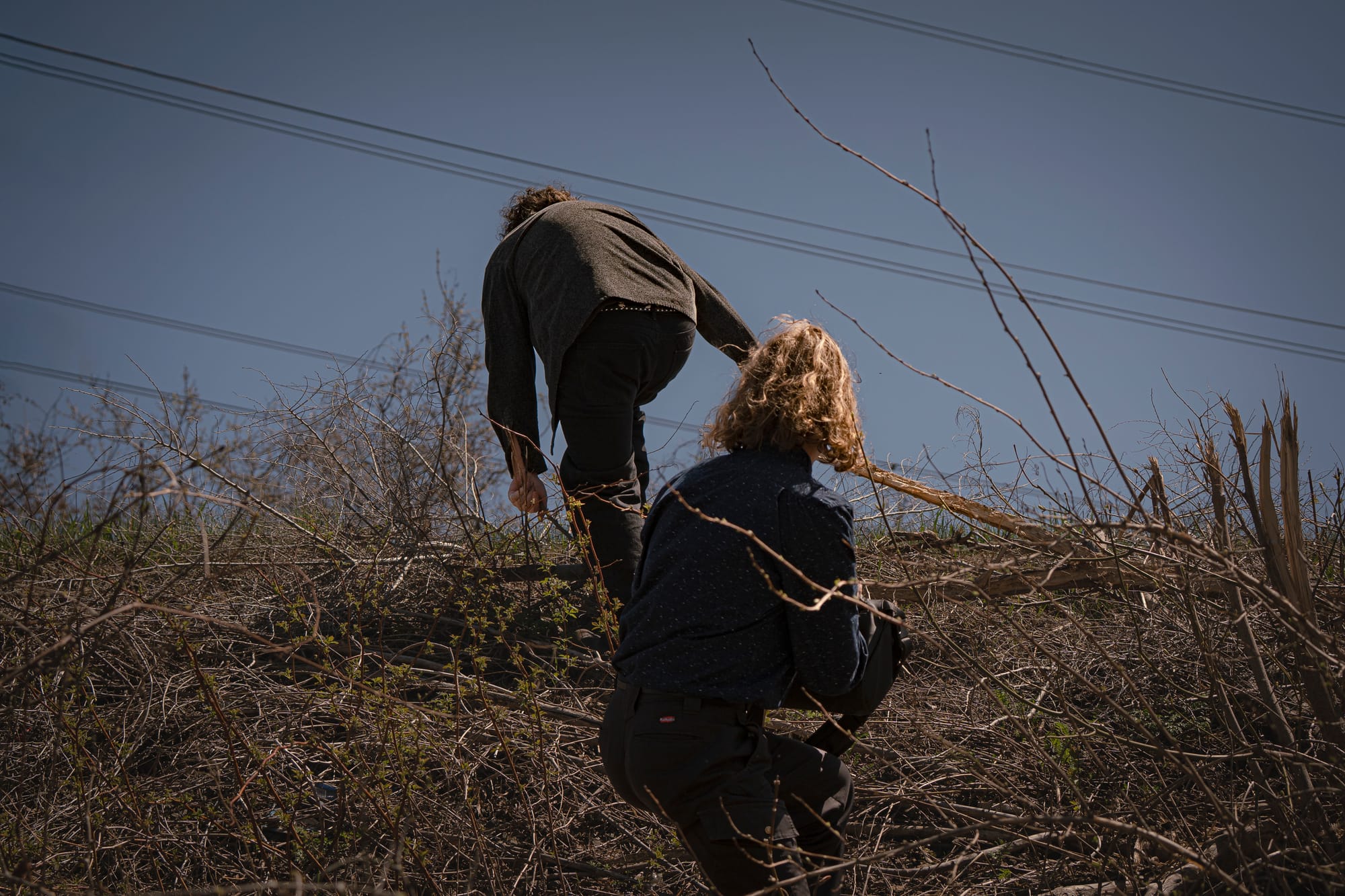
on concepts
Asaël
Eventually we decided: why not put Orchestroll up front, make it the main project, and try to make it a thing?
I think the starting point [of Corrosiv] is probably the track "Blistex"—when Jesse came up with that name based on how it felt to him, like a waxy type of vibe.
Jesse
"Blistex" was one of the first tracks we ever recorded that ended up on the album, and that's back when we wanted to make this really weird, heavy, very lush healing record, sort of like an over-the-top New Age record.
Asaël
It had a lot to do with—how can I say this—all the steps between "super dry" and "super wet," and healing and moisturizing, and "Blistex," the name, captured that.
Jesse
I think what happened is, I'm always quite conceptual in my approaches to albums, and the more we worked on writing grants in parallel to making "Blistex," and trying to earn artist residencies to make "Blistex," because we wanted to sort of have it be like a new media arts thing as well—where we used contact microphones in tanks with different fluids, to create the sound of healing, or moisture, through recording those fluids and using them in our music. But then, the more we worked on this material, we developed, somehow, another facet, which was more like "super distorted New Age."
Asaël
Yeah, at first, [before Corrosiv came together,] it was like [we were working in parallel on] two or three different album projects. There was another small project I wanted to do with a smaller label, and that's where "Cable Eater" came from, plus the more "corroded" stuff, like destroyed. Another was a "leftovers of leftovers" concept, just like jams that would last for hours, all the stuff that we did with the E-mu Morpheus—super weird and esoteric jams that we keep going back to and cutting up bits here and there to use everywhere in our music. On top of that, there was all the material that we recorded at EMS in Stockholm.
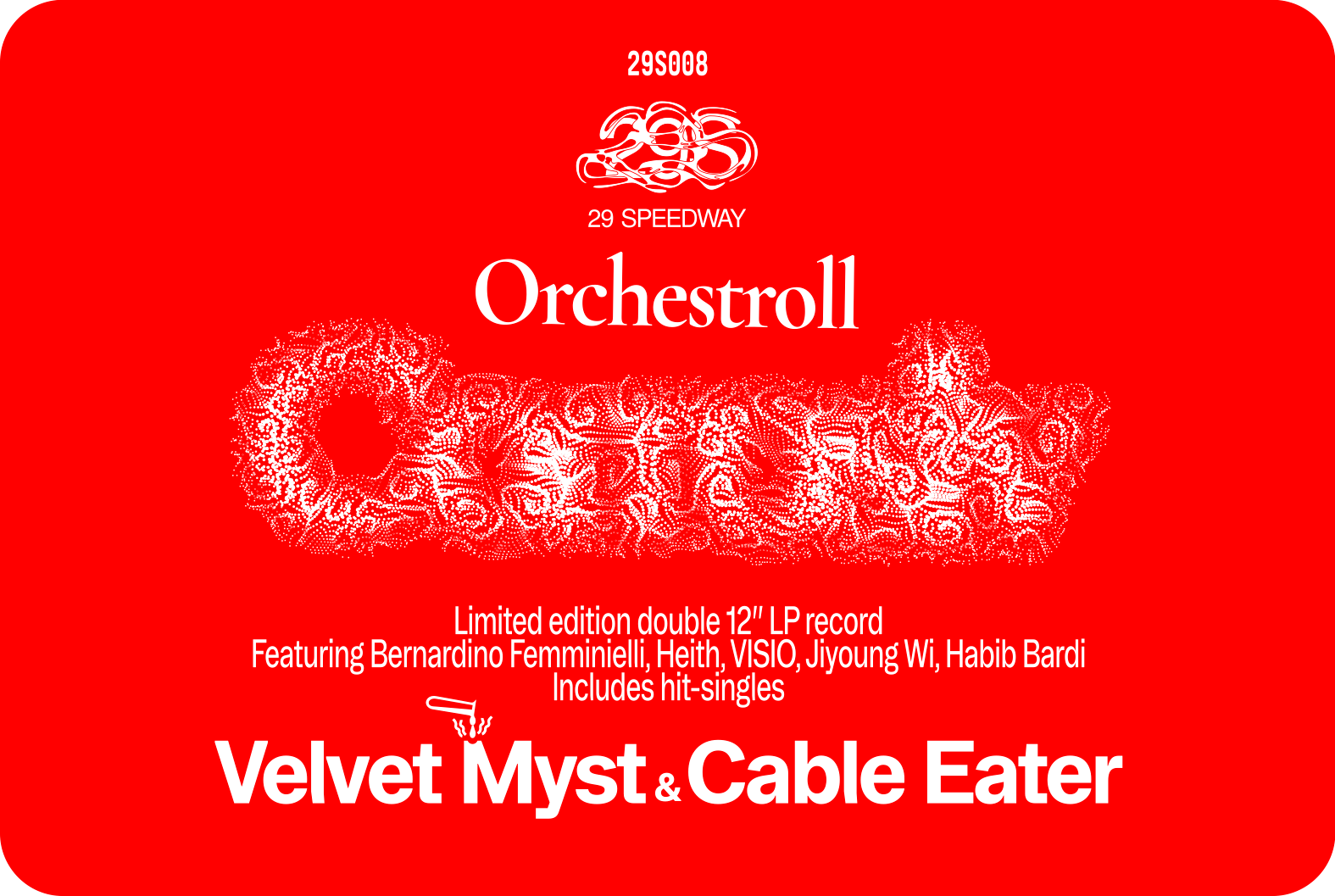
Jesse
At some point, we started editing down a long jam, which became the initial version of "Rust Halo." We listened to it, and we're like, Well, this is some weird halfway point between Steve Roach and some spa healing music. We thought, Oh, how do we make just one album? Because we had all these broken-up pieces, and we started accumulating them and placing them in the petri dish, and being like, Okay, how do we distort this? How do we push it further? We were trying to do that through the lens of thinking about new age music and wellness practice—all these things that are often presented as this beautiful kind of Westernized approach to Eastern medicine, but are usually reappropriation. And it often gets very dark when you start analyzing the underbelly of them. Corporate dynamics always find a way to seep in and take over.
But I don't want it to be that solid, that concept, because Corrosiv is much more than that. Corrosiv is corrosive. There's no other record, for me, that feels like that. I rarely go back and listen to my own work on loop, but Corrosiv somehow has a way of bringing me back. I'm obsessed with it.
on hybridization
Jesse
We were talking earlier about the concept of "soundsystem ambient music." I've always thought that "ambient music" could work in a club, especially bass heavy ambient, because those cycles you're hearing in the music, to me, they still have this rhythmic cadence to them.
Asaël
I also think modern ambient music has really brought back some form of drama, or narrative, in comparison to the early works, the classics, that are more environmental, kind of like staying in the same environment for one long track.
Jesse
There's also this tendency toward hybridization, which is integrating all kinds of genres or styles within "ambient." And what does that look like? Well, it looks like weird music designed to be played on soundsystems.
Thinking back to industrial music—to me, Coil were not industrial per se, but they embody that sensibility. I'm a huge fan of Coil, and people who love industrial music are super into Coil even though half of Coil's music is ambient, like a Berlin School vibe, or house music, or just sensual New Age—
Asaël
But the spirit is there.
Jesse
Exactly. The spirit is there.
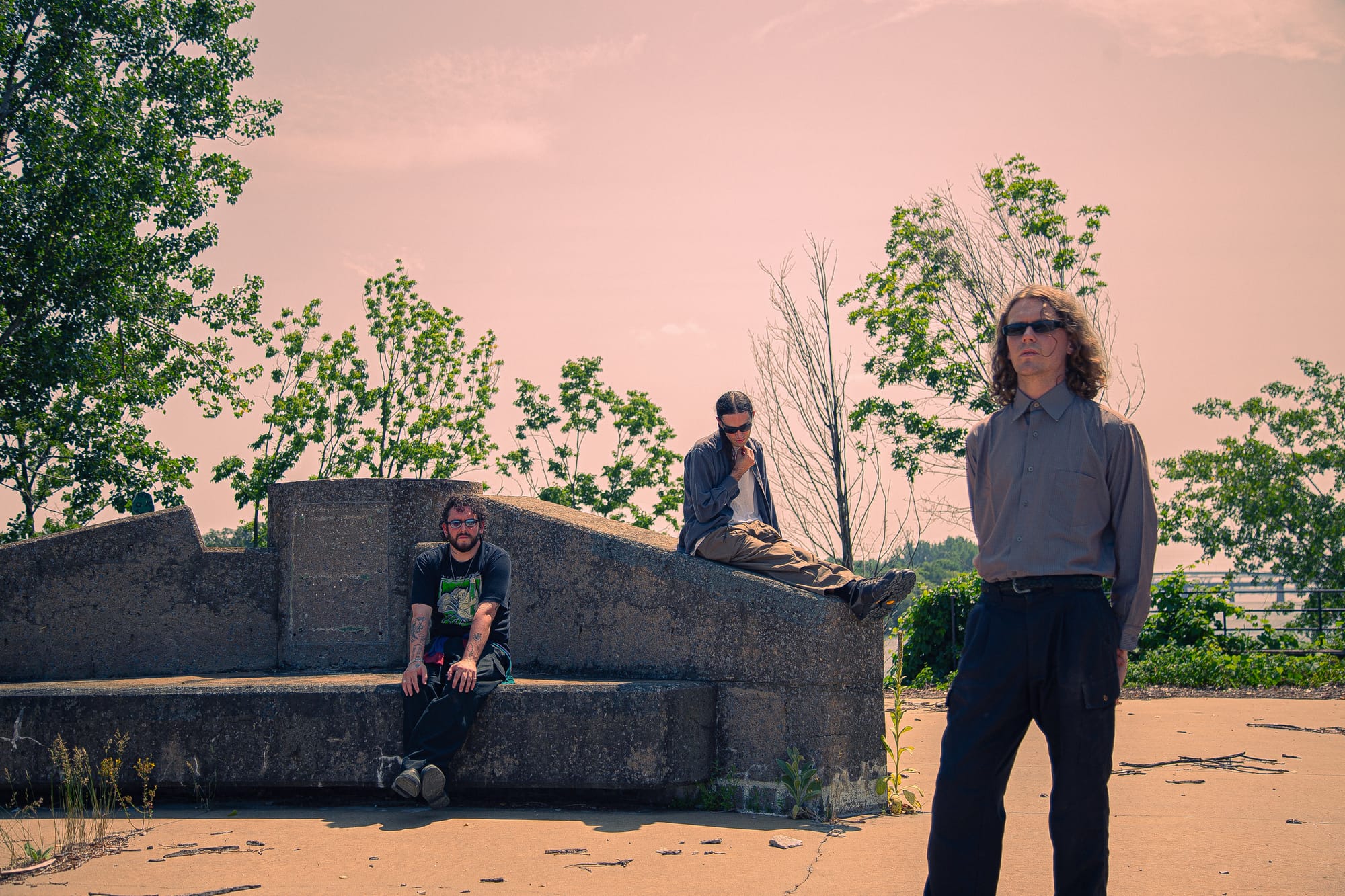
on collaboration
Asaël
So, ["Velvet Myst," produced in collaboration with Heith] is our popular track, a pop song. It's our pop song, the only pop song.
Jesse
I've known [Heith and the Haunter Records crew, based in Milan] since sometime around 2014. I was in Berlin, I moved to Berlin for about two years. While I was there, I think Francesco [Alessandri, who co-founded Haunter] reached out to me and was like, Hey, we're booking a night. You want to come play it? This was a night at Macao [in Milan]. Macao is, like, one of the coolest venues that has ever existed in Europe.
It was something like a squat, but they had the infrastructure and the resources to host proper events. So you would have a main room, two side rooms, and often shows outside in the backyard, some food, really nice cocktails, for really cheap. Saturnalia Festival was a festival hosted there for the better part of its lifetime. [Dan Heith and Francesco] invited me to play there. And as soon as I met both of them, Francesco and Daniela, I was like, These people are homies. They're really down to earth, and really deep and involved. They're just beautiful souls, and push led to shove, and we just started working together. We began collaborating quite fast.
Asaël
And by extension, I started to be in the mix, too.
Jesse
One of the turning points came pre-pandemic, when my mother died. I had moved back to Montreal [from Berlin], and had built this really nice relationship with Dan and Francesco, but I wasn't able to go to Europe because I was dealing with my mother's death. And so we moved back here, me and my partner Madison, and got this apartment where we are right now. In the summer, I wanted to see Dan, but I didn't want to go to Europe. Instead, I organized a show with Bernardino Femminielli at Bar Datcha [in Montreal], and Dan came out.
So we hosted Dan for about two weeks. And now that lockdown has ended, he's been coming back here every year, and we've just continued working on music.
Asaël
Our collaborations with [Dan Heith] are so genuine because, last summer, we went to Milan and stayed with him for a long time. After that he came to Montreal, and we prepared this show with him. It was kind of a continuous performance, in a sense. Orchestroll would play first, and then Heith would come on stage, and finish [the Orchestroll performance] with us. And then we would stay on stage, and play together with him as Heith.
One of the tracks that he played with us was what became "Velvet Myst." He kind of improvised his vocals on top of our music, and we liked it so much that we're like, This has to be the version on the album. After that, we recorded it at our studio here.
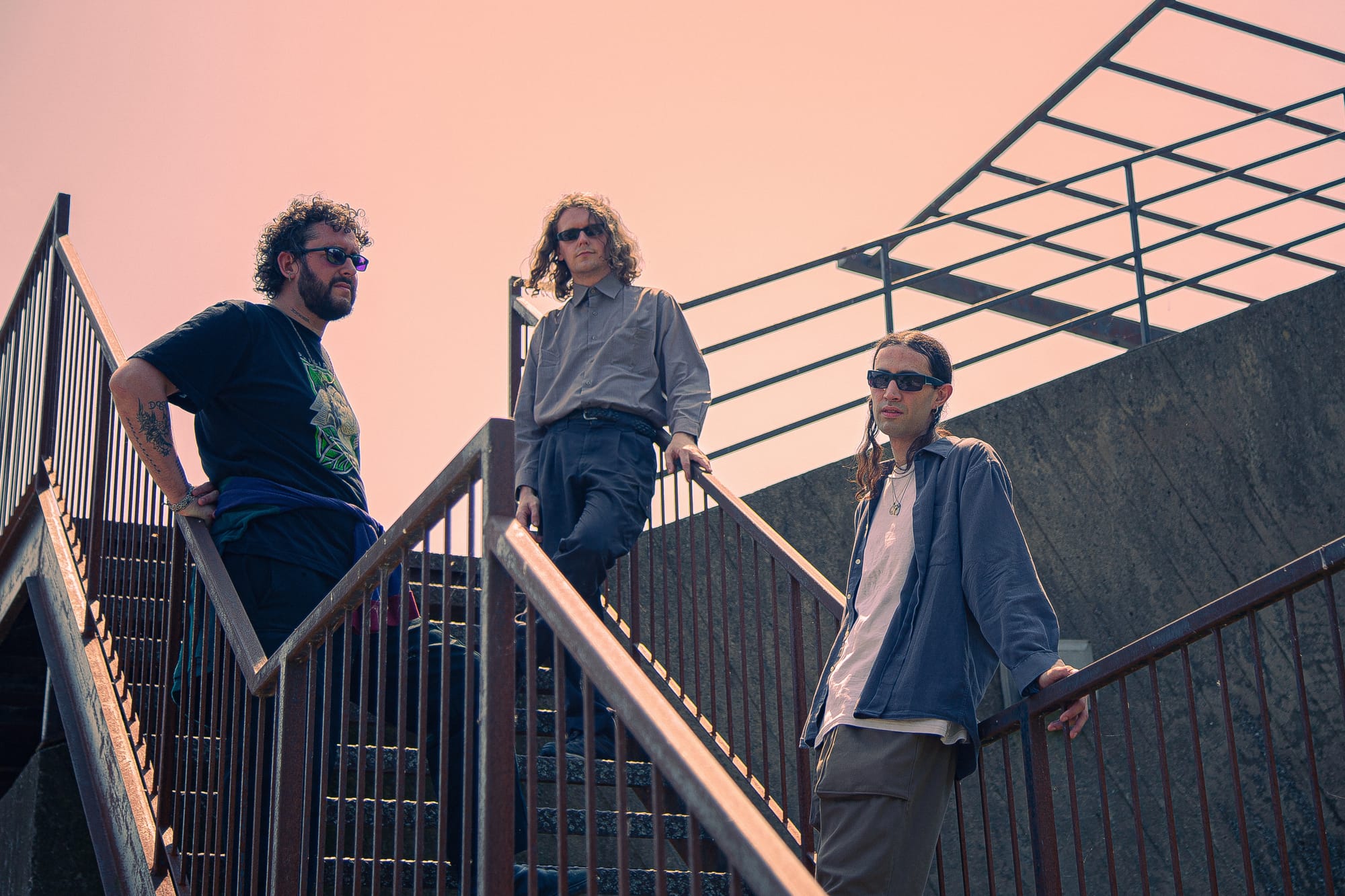
Jesse
It's all kind of a natural process, isn't it? You know, you talk to people online for years, you like each other's posts, you share each other's stuff, you fall in love with whatever they release. Eventually you get a bit, like, Oh, maybe I could work with them.
That's exactly how it was with Ben [Shirken, founder of NYC label and event series 29 Speedway, which released Corrosiv]. He was like, What are you working on right now? We had just made "Cable Eater" maybe the day before, and I sent it to him. He was like, Whoa, this is so fucking unique. Give me more.
And so I sent him the entire record, even though we didn't know what it was for. We had an hour and 16 minutes of music, and we thought that people would be like, This is way too much music. We can't release this.
But we sent it to Ben. He was like, Just send it to me. And we had a meeting with him—maybe a 15 minute meeting. And he said, This needs to be a double LP. We're doing the full hour and 16 minutes. We thought we were just going to have a quick chat with him.
I love everything [29 Speedway] released. I really liked that compilation [UltraBody, written up here]. I really appreciated what they do, and I'd hoped that when I went to New York, that they would be the ones organizing [an Orchestroll show].
So, yeah, it just came together really fast. And then Ben was like, Hey, you're going to Europe. I'm going to Europe. [Orchestroll recently wrapped a run of shows in Europe with Ben Shirken.]
So everything kind of lined up very naturally, and it made sense to do [Corrosiv on 29 Speedway]. I had been doing design work for him, too. It all just fell into place.
on performance
Asaël
[What we're doing with Orchestroll] is filling the void between things. It seems like it doesn't really fit anywhere, but actually, I feel like it does, and a lot of people have the potential to enjoy it—it's just a matter of context, and maybe being in front of a huge soundsystem.
Jesse
[In the live context,] our music really comes through to people. We've been playing the Society for Arts and Technology [SAT, a Montreal venue] a lot, and we've been packing the room every time.
Asaël
Some kids who are maybe used to more "normal" electronic music came up to us after the show, and they were like, What do you call this kind of music? I've never heard this before.
Jesse
The younger generation really loves what we're doing, too. It's really validating, because, you know, as you're getting older and older and have been making music longer and longer, you don't want to lose yourself, and make something boring.
I would say that Azzy is right, that [Orchestroll] fits in between things, because it's so hybridized and kind of strange. You know, a lot of artists try to, maybe, cater to "a certain thing." And I'm like, I don't know—I think people are able to handle this weird shit, actually.
Of course, we're always hoping that more people listen to [Orchestroll], and we're still kind of struggling to get our name out there, because it is a new project. But the feedback has been really positive.
Asaël
Especially in live concerts.
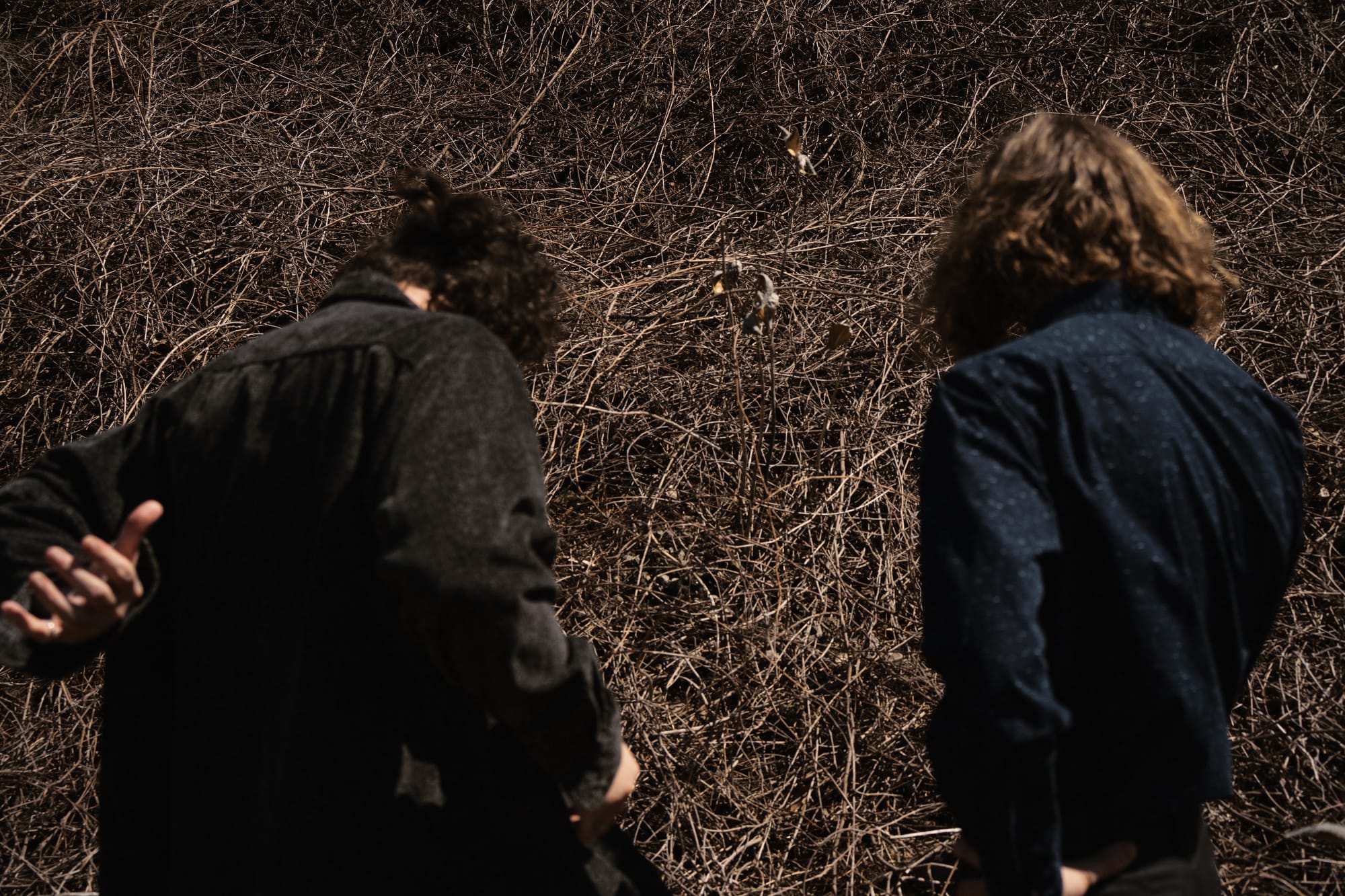
Jesse
We're about to head to Europe to do six shows. I'm not gonna lie, [setting up this tour] has been a really stressful thing, because it's like going on tour now feels like you're investing [in your own music]. It's like, Hey, can you, like, follow our band on the internet and just listen to our music, please? [laughing]
Asaël
[laughing] I mean, I'm excited to do it.
Jesse
It feels stressful, but it's also something that comes with the record, and I'm excited to play Corrosiv live, to see where the songs go now. We played in a church recently. It was the first time we ever played a live version of Corrosiv and, like, "Nerveghost" sounded like a country song. It was really great. I'm excited to see what kind of weird surprises pop up.
Asaël
[Improvisation] is a basic foundation of Orchestroll, I would say.
Jesse
You know, the "press spacebar and add effects" [method of performing live]—I've done that several times myself. Sometimes you just have to, with a lot of electronic music.
But now, for me, it's now taking a turn toward wanting to have fun with it. Whereas before, it was kind of like, I want people to know my music properly, so it needs to be perfect when people hear it. But with Orchestroll, it's more like, How do we bastardize it?
I'm the type of person that will always be stressed before a gig. And so if I'm going to be stressed for a gig, I might as well be stressed for a reason, you know? Take some risks while I'm up there. Because if I'm stressed and I'm just going to hit the spacebar and put effects on stuff—no, I need to be stressed for something more.
Asaël
At some point, if you just "press spacebar and add a few effects," thinking that is going to be easier on yourself, you start to become very self conscious—like, What am I doing here? And then that means I'm not really even into the music that much. So instead, yes, take some risks and improvise with it.
Jesse
We've been doing this for a long time too, you know. But I do agree with Azzy. At some point, it's like, Why am I doing this? What am I doing? There's no ritual, kind of, to the thing. And it's important—I want to perform. I want to engage.
I want the ghost of the machine to whisper something back into me, and I want to exchange with it.
